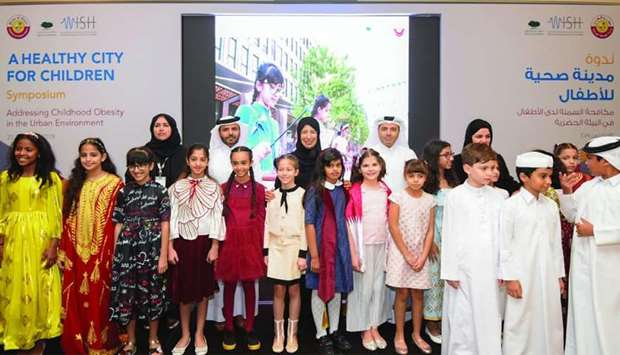The Ministry of Public Health (MoPH) and its partners are working to build sustainable projects that will contribute to a long-term healthy life for current and future generations, based on Qatar National Vision 2030.
The observation was made by HE the Minister of Public Health Dr Hanan Mohamed al-Kuwari, who opened a symposium titled 'A Healthy City for Children' on Thursday in the presence of HE the Minister of Education and Higher Education Dr Mohamed Abdul Wahed Ali al-Hammadi.
The symposium, organised by the MoPH in collaboration with the World Innovation Summit for Health (WISH), was attended by local and international experts, health sector participants and university students.
The seminar showcased key local, regional and international plans, initiatives and experiences for innovation and the development of an action plan for a healthy city for children in Qatar and focused on addressing childhood obesity in the urban environment.
In a statement, HE Dr al-Kuwari said the symposium covers two national priorities in the National Health Strategy 2018-2022: 'Health in All Policies' and 'Healthy Children and Adolescents'. She noted that Qatar is seeking to acquire the World Health Organisation Healthy City Accreditation by 2022, which will provide sustainable and healthier options for the population, especially children.
She stressed that the implementation of the Healthy Cities approach aims to ensure that there are appropriate environments in the cities of Qatar that support and promote health. She also highlighted the critical importance of promoting joint work with all partners of the MoPH from different sectors to achieve this goal.

HE the Minister of Public Health Dr Hanan Mohamed al-Kuwari and HE the Minister of Education and Higher Education Dr Mohamed Abdul Wahed Ali al-Hammadi with other dignitaries.
During the ceremony, a short film, produced especially for the event by Qatar Foundation, was screened showing the most important sustainable benefits of a healthy city for children, in which a number of young stars from Qatar Academy schools embodied the vision of a healthy city and the benefits to be achieved for generations to come.
In the opening speech, Dr Salih Ali al-Marri, Assistant Minister for Health Affairs at the MoPH, said the contribution of medical care to better health outcomes is about 10-20%. The remaining 80-90% is determined by health-related, socio-economic and environmental factors.
Dr al-Marri noted that the National Health Strategy has identified 'Health in All Policies' as a national health priority and developed concrete plans and objectives to ensure an inter-sectoral collaborative approach to improving health and equity for Qatar’s population.
He also reviewed a number of achievements with regard to combating obesity in Qatar, such as the excise tax on carbonated drinks and the Eco-Schools scheme, among others.
Sultana Afdhal CEO of WISH, said it is important that people from different sectors work together. She added that she was pleased to work with the MoPH to deliver this event and highlight innovative initiatives and programmes in this field locally and globally.
Dr Sadria al-Kohji, priority leader of 'Healthy Children and Adolescents' in the National Health Strategy, explained that childhood obesity is one of the main challenges facing Qatar, with statistics showing that 18.8% of males and 15.5% of females under 20 suffer from obesity.
She also noted that through the National Health Strategy, several important initiatives that aim at promoting a healthy and safe environment for children and adolescents are being implemented. She noted that the "healthy cities approach supports our strategic objectives which we seek to achieve for children and adolescents".
During the seminar, regional and international experiences in the field of healthy cities were reviewed by Erion Veliaj, mayor of Tirana in Albania; Professor Peter Bergsten of Uppsala University in Sweden; Dr Amal al-Yahya, head of Healthy Cities at the Ministry of Health in Kuwait; and Dr Huda al-Siyabi, director of Community Initiatives at the Ministry of Health in Oman.
The symposium included two key panel discussions as well as two workshops.

